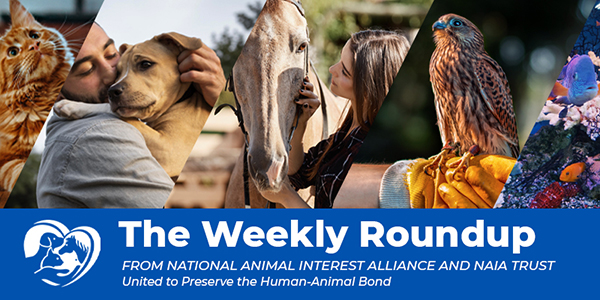
Inside This Issue:
- Too Much Monkey Business in Lopburi Spurs Government Action
- A (Short) Prison Sentence in Animal Rescue Neglect Case
- We Learned a Lot About Self-Medication from Animals
- Vaccine Study Aims to Protect Koalas from Chlamydia
- Enlisting Goat Power in the Fight Against Wildfires
Too Much Monkey Business in Lopburi Spurs Government Action

In this monkey's defense, who can resist a good pineapple?
Lopburi, Thailand’s “Monkey City,” is taking action against its iconic crab-eating macaques. The city’s monkeys are a longtime tourist attraction and the stars of a yearly cultural event, but alas, too much monkey business is bad for business. As Lopburi’s city-adapted monkey population has boomed, the clever primates' antics have become more troublesome – and more aggressive.
Naughty behavior from the city’s macaques is a longtime issue. That’s just a given when you mix people and wildlife – especially wildlife that have adapted to urban environments. However, problems have increased and been punctuated by recent events. First when the empty city was essentially taken over by marauding macaques during the COVID lockdowns in 2020-21, and more recently after highly publicized incidents of monkeys knocking motorcyclists off their bikes and injuring tourists.
There are clearly practical issues of public health and safety and of protecting property that must be addressed here. Somewhat more tricky is balancing this all with Lopburi’s reputation as “Monkey City” and a great tourist destination. Many locals are at their wits’ ends over the monkeys, but the animals are a feature, not a bug – you can’t just get rid of ‘em. So the city has opted to reduce and control its population of monkeys via capture, sterilization, then shipping lots of them out of town. This is a middle ground: enough monkeys to retain the city’s image and attract visitors, but not so many as to make the locals miserable. Whether this is successful remains to be seen: the macaques are highly intelligent, and it’s hard to trick them the same way twice. Further, if the monkey population has learned that being aggressive is the best way to get what it wants, that makes the issue more complicated than simply reducing their numbers and decreasing competition for resources.
A (Short) Prison Sentence in Animal Rescue Neglect Case
A South Carolina woman was sentenced to 10 days in prison and a $200 fine after pleading guilty to multiple counts of animal neglect. She ran a rescue that had 61 animals – dogs, cats, and livestock – seized by local animal services officials due to numerous deficiencies in their care. We don’t need to go down the whole list, because you are probably already imagining the situation: feces and dirty water, lack of appropriate food and shelter, and two “inappropriately disposed of” dead animals.
This serves as a reminder that just about anyone can call themselves a “rescue,” and that everyone who is responsible for such a large number of animals – no matter how noble their stated goals may be – needs to be subject to reasonable regulations and inspections. Not just for the sake of the animals that are being cared for, but for the health of animal caretakers and the surrounding community as well. In this case, if it hadn’t been for complaints from a concerned citizen, who knows how long conditions at the rescue would have festered? On the bright side, Colleton County Animal Services can pat themselves on the back for a job well done: staff and volunteers spent several weeks getting the seized animals back into shape, and managed to find new homes for all of them. Considering the number of animals, as well as how many different species they were working with, that is truly a remarkable feat!
We Learned a Lot About Self-Medication from Animals

A wounded goat seeks relief in the form of dittany. O. Dapper, CC.
Many animals seek out specific plants to use as medicine if they are sick or injured. This behavior was well documented in the writings of scholars during the height of the Roman Empire, and emulated long before that by indigenous people. In fact, in many cases, human beings learned the medicinal value of plants by observing animal behavior.
Animals using plants as medicine, also known as zoopharmacognosy, is a fascinating field of study that reveals the intricate behaviors and adaptive strategies of wildlife. The phenomenon has been met with renewed interest since a wild male orangutan was observed applying medicinal leaves to a wound he sustained while fighting. The leaves healed his face so well, he was left with barely noticeable scarring. And this isn’t just a primate thing– all kinds of animals have been observed engaging in acts of zoopharmacognosy: goats, sheep, bears, birds, elephants, and even butterflies, to name a few.
These examples highlight the diverse and ingenious ways animals utilize plants to maintain their health and combat various ailments. The study of these behaviors not only provides insights into animal ecology and evolution but also has potential applications in developing new medicinal compounds for human use. Just as we have much more to learn using modern medicine, we may be able to add more to our library by watching more animals use plants.
Vaccine Study Aims to Protect Koalas from Chlamydia
An icon of the Land Down Under, koalas hail from the eucalyptus forests and woodlands of eastern and southern Australia. Their numbers have declined significantly due to hunting and habitat loss, and their population is chaotically scattered – in some parts of Australia, they are critically endangered, in others they are a nuisance. Today, koalas are protected by legislation, but they still face numerous challenges, few as devastating as the bacterial infection Chlamydia, which is wreaking havoc on their already compromised and fragmented populations.
Chlamydia can be fatal to koalas and is transmitted either sexually or from mother to joey. It can cause severe reproductive tract infections, leading to infertility in both male and female koalas – exactly what you don’t want in a declining population. Antibiotic treatments, primarily using tetracyclines or macrolides, can be effective. However, treatment is challenging due to koalas' specialized diet and sensitive digestive systems.
Efforts are underway to develop effective vaccines. Recent trials have shown promise in providing some level of protection against chlamydia. That’s where Ken Beagley and his team from Queensland University of Technology come in. They are working alongside Dr. Michael Pyne at Currumbin Wildlife Hospital to develop and test a koala vaccine for Chlamydia. The small population of koalas they are testing with the vaccine are thus far coming back Chlamydia free, and an implanted booster is able to administer another dose without having to recapture the koalas. Researchers hope that the vaccine efficacy keeps the disease at bay long enough for the population to recover and for any vet to be able to get the vaccine on demand.
Enlisting Goat Power in the Fight Against Wildfires

If this is paradise...
This year, the city of Louisville, Colorado hopes to mitigate damage from the upcoming fire season by unleashing goat power. 700 goats have arrived in the community to munch down on excess vegetation, and they’ve already made a dent in the landscape. It only takes these goats about 8 hours – about a full workday – to clear an acre, and when they’re done in Louisville, they’ll move on to the next town.
The goats are just doing what they like to do – eat, bleat, and explore. So it’s a good time for them. And as they pass through each community, they provide residents with a valuable buffer against wildfires, or at the very least, buy valuable time for fire crews. How cool is that?
Goats, as one of the oldest domesticated animals on the planet, have long been highly valued for their meat, milk, hair, and even manure. Depending on how Colorado’s fire seasons end up going, we might have to start crediting these amazing ungulates with being natural fire retardants, too!
Also in the News...
★ Owner Concerned About Cat's Behavior Makes Shocking Discovery (If You Guessed "Pregnancy," You Win the Prize)
★ How genes shape birdsong, even when birds grow up far from home (Bird Song in the Genes)
★ Woman searching for nearly 130 missing cows (Big Loss & Likely Theft)
★ Snow leopards, gorillas among new Philadelphia Zoo welcomes new animals for summer of 2024 (Zoos; Endangered Species; Family Outings)
★ Montebello French bulldog named ‘Jennifer' stolen at gunpoint (Another French Bulldog Robbery; Yikes!)
★ Kids learn about farm animals during Hobe Sound Farmers Market event (Kids & Animals; Hands-On Learning)
★ 10 Far Side Comics That Prove Gary Larson Preferred Animals Over Humans (Goofy Lists & Comics; The Far Side Classics; Anthropomorphism Done Funny; This Isn't Scientific)
★ If There Was A 'Pretty Privilege' In The Animal World, These Critters Would Be Getting All The Luxuries (Bonus Goofy Lists & Photos; Earned Via Cuteness)
Click here to see what is happening legislatively



